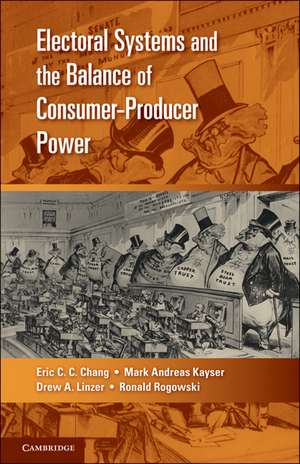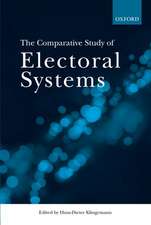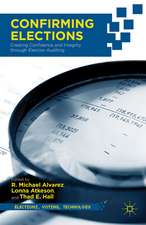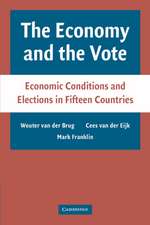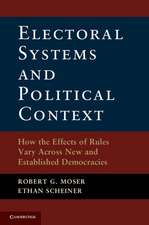Electoral Systems and the Balance of Consumer-Producer Power: Cambridge Studies in Comparative Politics
Autor Eric C. C. Chang, Mark Andreas Kayser, Drew A. Linzer, Ronald Rogowskien Limba Engleză Paperback – 21 noi 2010
| Toate formatele și edițiile | Preț | Express |
|---|---|---|
| Paperback (1) | 210.33 lei 6-8 săpt. | |
| Cambridge University Press – 21 noi 2010 | 210.33 lei 6-8 săpt. | |
| Hardback (1) | 614.34 lei 6-8 săpt. | |
| Cambridge University Press – 21 noi 2010 | 614.34 lei 6-8 săpt. |
Din seria Cambridge Studies in Comparative Politics
-
 Preț: 179.15 lei
Preț: 179.15 lei -
 Preț: 267.61 lei
Preț: 267.61 lei -
 Preț: 239.36 lei
Preț: 239.36 lei - 9%
 Preț: 594.67 lei
Preț: 594.67 lei -
 Preț: 160.82 lei
Preț: 160.82 lei -
 Preț: 269.58 lei
Preț: 269.58 lei -
 Preț: 264.74 lei
Preț: 264.74 lei -
 Preț: 177.28 lei
Preț: 177.28 lei -
 Preț: 225.70 lei
Preț: 225.70 lei -
 Preț: 164.94 lei
Preț: 164.94 lei -
 Preț: 236.42 lei
Preț: 236.42 lei -
 Preț: 185.64 lei
Preț: 185.64 lei -
 Preț: 233.13 lei
Preț: 233.13 lei -
 Preț: 206.71 lei
Preț: 206.71 lei -
 Preț: 231.82 lei
Preț: 231.82 lei -
 Preț: 206.52 lei
Preț: 206.52 lei -
 Preț: 201.24 lei
Preț: 201.24 lei -
 Preț: 358.37 lei
Preț: 358.37 lei -
 Preț: 203.42 lei
Preț: 203.42 lei -
 Preț: 232.45 lei
Preț: 232.45 lei -
 Preț: 257.82 lei
Preț: 257.82 lei -
 Preț: 191.12 lei
Preț: 191.12 lei -
 Preț: 158.77 lei
Preț: 158.77 lei -
 Preț: 199.05 lei
Preț: 199.05 lei - 11%
 Preț: 553.80 lei
Preț: 553.80 lei - 11%
 Preț: 695.06 lei
Preț: 695.06 lei -
 Preț: 288.80 lei
Preț: 288.80 lei -
 Preț: 262.06 lei
Preț: 262.06 lei - 11%
 Preț: 691.66 lei
Preț: 691.66 lei -
 Preț: 388.29 lei
Preț: 388.29 lei -
 Preț: 288.04 lei
Preț: 288.04 lei -
 Preț: 228.00 lei
Preț: 228.00 lei -
 Preț: 385.28 lei
Preț: 385.28 lei -
 Preț: 312.89 lei
Preț: 312.89 lei -
 Preț: 224.44 lei
Preț: 224.44 lei -
 Preț: 287.07 lei
Preț: 287.07 lei -
 Preț: 251.27 lei
Preț: 251.27 lei -
 Preț: 313.70 lei
Preț: 313.70 lei -
 Preț: 277.38 lei
Preț: 277.38 lei -
 Preț: 423.79 lei
Preț: 423.79 lei - 11%
 Preț: 552.94 lei
Preț: 552.94 lei - 11%
 Preț: 554.43 lei
Preț: 554.43 lei - 14%
 Preț: 783.26 lei
Preț: 783.26 lei
Preț: 210.33 lei
Nou
Puncte Express: 315
Preț estimativ în valută:
40.25€ • 41.91$ • 34.02£
40.25€ • 41.91$ • 34.02£
Carte tipărită la comandă
Livrare economică 11-25 martie
Preluare comenzi: 021 569.72.76
Specificații
ISBN-13: 9780521138154
ISBN-10: 0521138159
Pagini: 280
Ilustrații: 27 b/w illus. 9 tables
Dimensiuni: 139 x 215 x 19 mm
Greutate: 0.38 kg
Editura: Cambridge University Press
Colecția Cambridge University Press
Seria Cambridge Studies in Comparative Politics
Locul publicării:New York, United States
ISBN-10: 0521138159
Pagini: 280
Ilustrații: 27 b/w illus. 9 tables
Dimensiuni: 139 x 215 x 19 mm
Greutate: 0.38 kg
Editura: Cambridge University Press
Colecția Cambridge University Press
Seria Cambridge Studies in Comparative Politics
Locul publicării:New York, United States
Cuprins
1. Introduction; 2. Electoral systems and consumer power: theoretical considerations; 3. Electoral systems and real prices: panel evidence for the OECD countries; 4. Electoral systems and real prices around the world; 5. A closer look: case studies and mechanisms; 6. Socio-economic origins of electoral systems; 7. Discussion and conclusion.
Recenzii
“Government policies create winners and losers. A central question in both politics and political science is how the political system affects who wins and who loses from the battle over policy. In Electoral Systems and the Balance of Consumer-Producer Power, four leading scholars assess the impact of electoral structures on one crucial dimension of this distributional conflict, between consumers and producers. They present a forceful, theoretically grounded, argument that majoritarian systems tend to favor consumers. They go on to provide persuasive evidence, across dozens of countries, that this pro-consumer bias is reflected in relative prices. This elegant, powerful, book will be essential reading for all students of Comparative Politics and Political Economy.”
—Jeffry Frieden, Harvard University
“This terrific book argues that economic policy's general pro-consumer versus pro-producer tendency hinges crucially on the electoral system. The argument is rigorously developed and tested while remaining eminently accessible to general readers. It is a ‘must read’ for political economists and indeed anyone interested in seeing a wonderful example of social science done well.”
—Michael J. Gilligan, New York University
—Jeffry Frieden, Harvard University
“This terrific book argues that economic policy's general pro-consumer versus pro-producer tendency hinges crucially on the electoral system. The argument is rigorously developed and tested while remaining eminently accessible to general readers. It is a ‘must read’ for political economists and indeed anyone interested in seeing a wonderful example of social science done well.”
—Michael J. Gilligan, New York University
Notă biografică
Descriere
Investigates the effects of electoral systems on the relative legislative and, hence, regulatory influence of competing interests in society.
